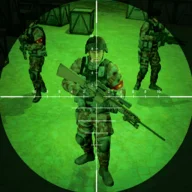Night Vision Sniper Shooting:
As a sniper, having the ability to see in low-light conditions can give you a significant advantage on the battlefield. Night vision technology has come a long way in recent years, making it easier for snipers to hit their targets with greater accuracy. In this article, we will explore the world of night vision sniper shooting, including techniques, gear, and tips.
Introduction
Night vision sniper shooting is a specialized skill that requires a combination of knowledge, experience, and equipment. With the right gear and training, snipers can engage targets in low-light conditions with high accuracy.
Understanding Night Vision Technology
Before we dive into the techniques and tips for night vision sniper shooting, it’s important to understand how night vision technology works. Night vision devices use a combination of lenses, sensors, and image intensifiers to amplify available light and create a clear image in low-light conditions.
Types of Night Vision Devices
There are several types of night vision devices available for snipers, including:
- Image intensifiers
- Thermal imaging devices
- Infrared imaging devices
Each type of device has its own strengths and weaknesses and is suited to different types of missions.
Night Vision Shooting Techniques
Shooting in low-light conditions requires a different approach than shooting during the day. Here are some techniques that snipers can use to improve their night vision shooting skills:
1. Adjust Your Shooting Position
In low-light conditions, it can be difficult to see your target clearly. By adjusting your shooting position, you can take advantage of the available light and increase your visibility.
2. Use a Stable Shooting Platform
Maintaining a stable shooting platform is critical for accuracy. Using a bipod or tripod can help stabilize your weapon and improve your aim.
3. Take Advantage of Technology
Night vision devices can give you a significant advantage in low-light conditions. By using the right technology, you can increase your visibility and accuracy.
Night Vision Shooting Gear
In addition to night vision devices, there are several other types of gear that can help snipers improve their shooting skills in low-light conditions. Here are some examples:
- Illuminated reticles
- Low-light scopes
- Night vision binoculars
Tips for Night Vision Sniper Shooting
Here are some additional tips that can help snipers improve their night vision shooting skills:
1. Practice, Practice, Practice
Like any skill, night vision shooting takes practice. Spend time at the range or in simulated environments to develop your skills.
2. Stay Alert
In low-light conditions, it can be easy to miss important details. Stay alert and vigilant to ensure you don’t miss any potential threats.
3. Be Patient
Night vision shooting requires patience and discipline. Take your time to line up your shot and make sure you have a clear target.
Conclusion
Night vision sniper shooting is a valuable skill that can give snipers a significant advantage in low-light conditions. By understanding night vision technology, using the right gear, and practicing the right techniques, snipers can improve their accuracy and effectiveness on the battlefield.night vision sniper shooting is a specialized skill that requires knowledge, experience, and the right gear. With the right combination of technology, techniques, and training, snipers can engage targets in low-light conditions with high accuracy. It’s important for snipers to understand the different types of night vision devices available and to practice the right shooting techniques in low-light conditions. By staying alert, patient, and disciplined, snipers can improve their accuracy and effectiveness on the battlefield. As always, it’s important to check local laws and regulations before purchasing or using night vision gear. With the right approach, night vision sniper shooting can be a valuable tool for snipers in a variety of missions and situations.
FAQs
- Is night vision shooting legal for civilians?
- In most countries, night vision devices are legal for civilian use. However, it’s important to check local laws and regulations before purchasing or using night vision gear.
- How far can I see with night vision devices?
- The range of a night vision device depends on several factors, including the type of device and the available light. In general, most night vision devices have a range of a few hundred yards.
- Do night vision devices work in complete darkness?
- Night vision devices require some available light to function. However, some types of devices, such as thermal.




